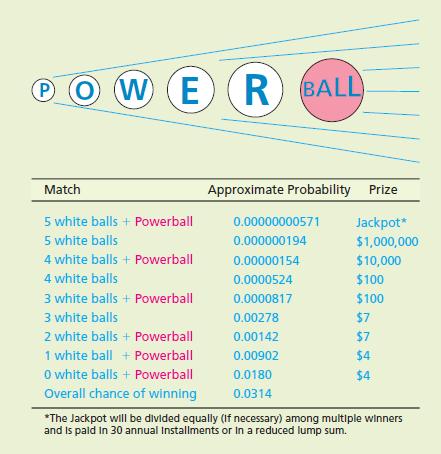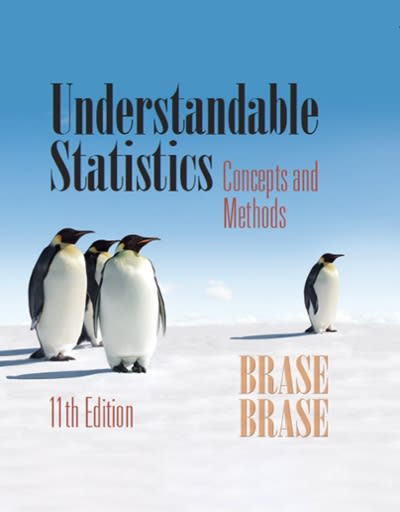1. Powerball! Imagine, you could win a jackpot worth at least $40 million. Some jackpots have been...
Question:
1. Powerball! Imagine, you could win a jackpot worth at least $40 million. Some jackpots have been worth more than $250 million! Powerball is a multistate lottery. To play Powerball, you purchase a $2 ticket. On the ticket you select five distinct white balls (numbered 1 through 59) and then one red Powerball (numbered 1 through 35). The red Powerball number may be any of the numbers 1 through 35, including any such numbers you selected for the white balls. Every Wednesday and Saturday there is a drawing. If your chosen numbers match those drawn, you win! Figure 5-7 shows all the prizes and the probability of winning each prize and specifies how many numbers on your ticket must match those drawn to win the prize. The Multi-State Lottery Association maintains a web site that displays the results of each drawing, as well as a history of the results of previous drawings. For updated Powerball data, visit the Brase/Brase statistics site at http://www.cengage.com/
statistics/brase11e and find the link to the Multi-State Lottery Association.
(a) Assume the jackpot is $40 million and there will be only one jackpot winner.
Figure 5-7 lists the prizes and the probability of winning each prize.
What is the probability of not winning any prize? Consider all the prizes and their respective probabilities, and the prize of $0 (no win) and its probability.
Use all these values to estimate your expected winnings m if you play one ticket. How much do you effectively contribute to the state in which you purchased the ticket (ignoring the overhead cost of operating Powerball)?
(b) Suppose the jackpot increased to $100 million (and there was to be only one winner). Compute your expected winnings if you buy one ticket. Does the probability of winning the jackpot change because the jackpot is higher?
(c) Pretend that you are going to buy 10 Powerball tickets when the jackpot is
$40 million. Use the random-number table to select your numbers. Check the Multi-State Lottery Association web site (or any other Powerball site)
for the most recent drawing results to see if you would have won a prize.
(d) The probability of winning any prize is about 0.0314. Suppose you decide to buy five tickets. Use the binomial distribution to compute the probability

of winning (any prize) at least once. Note: You will need to use the binomial formula. Carry at least three digits after the decimal.
(e) The probability of winning any prize is about 0.0314. Suppose you play Powerball 100 times. Explain why it is appropriate to use the Poisson approximation to the binomial to compute the probability of winning at least one prize. Compute l 5 np. Use the Poisson table to estimate the probability of winning at least one prize.
Step by Step Answer:

Understandable Statistics Concepts And Methods
ISBN: 9781305142909
11th Edition
Authors: Charles Henry Brase, Corrinne Pellillo Brase





